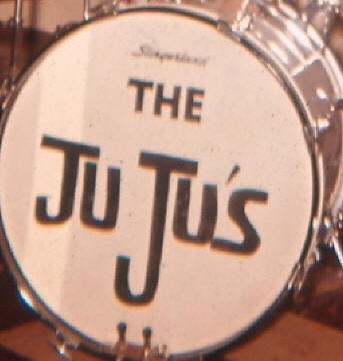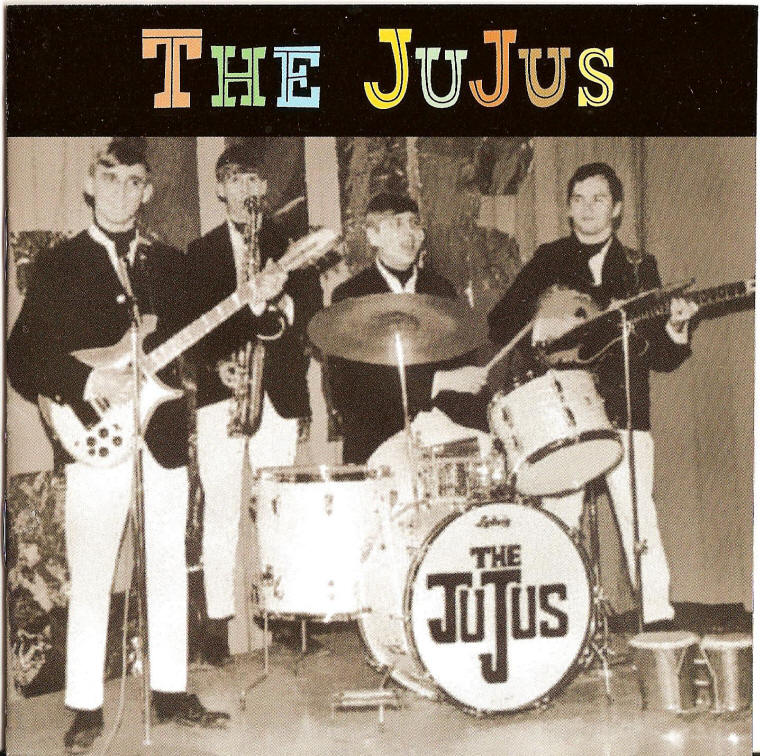
- You Treat Me Bad (alternate version)
- Hey Little Girl (alternate version)
- Runaround Girl
- I’m Cryin’
- I Love Her So
- She’s My Girl
- There She Goes
- The Gentle Rain (Fenton Records Single #2188-b side)
- Fine Day (Fenton Records Single #2188-a side)
- It’s Gonna Be Alright
- You Treat Me Bad (Fenton Records Single #1004-a side)
- I’m Really Sorry (United Records Single #121570-a side)
- Do You Understand Me (United Records Single #121569-b side)
- Sometime Or Other
- If You Really Love Me
- In The Park
- Hey Little Girl (Fenton Records Single #1004-b side)
- Come On Children
- The Gentle Rain (alternate stereo version)
- Fine Day (alternate stereo version)
- I’ll Be There
- I Don’t Want To See You Again
- Open Up Your Door
All tracks recorded from 1965-1967.
Compiled and Produced by Michael Greisman and Rod Shepard.
© (p) 2009 Cicadelic Records P.O. Box 30054 Tucson, Arizona 85751
Since their arrival on the music scene in 1965, the mystique of The JuJus and their lead singer, Ray Hummel, has continued to grow over the ensuing decades (helped along by the inclusion of “You Treat Me Bad” on the first volume of Pebbles in 1979). Their first single “You Treat Me Bad” rose to the number two position on the top 40 and catapulted the band to regional fame in Michigan. The JuJus initially blended an impressive brand of folk-rock and British-Invasion sounds with a raw garage band sound. In 1967 they opted for a more psychedelic sound. Compiled on this CD are all The JuJu singles, as well as a plethora of unreleased gems from 1965 to 1967. A detailed booklet contains photos, radio surveys, band memorabilia, and a retrospective of The Jujus as related by band member, Rod Shepard. The front cover
60s: When and where were The JuJus formed? RS: The JuJus were formed in 1964. Originally there was Max “Junior” Colley on sax, Bill Gorski on drums, and me on guitar. We later added Ray Hummel on lead vocal, harmonica, and rhythm guitar, and I switched to bass. After Ray left we added Rick Stevens on guitar on February 12, 1966. Max left, and for another short time we had a singer named Brett Wells. Then Gorski went to Uncle Sam and Brett went on to golf. That pretty much left Rick and me, so we added Ronn Burke for vocals and guitar, and Ron Homrich on drums. Then, in '67, I went to Uncle Sam and the band’s history was lost.
60s: Where did the name
"JuJus" come from? RS:The name was simply Max’s little kid brother’s
inability to say Max’s nick name “Junior” so he called him JuJu. The name
had nothing to do with the
candies.
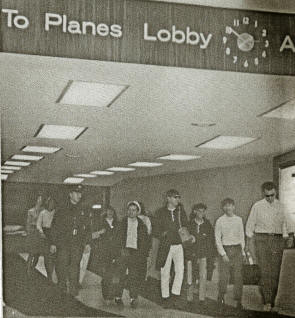
60’s:Where did The JuJus
typically play?
RS: We had the honor of our first “professional” job being at the
Ionia State Reformatory for the Criminally Insane. It was a great start as
we had an overly enthusiastic, captive audience. The JuJus played nearly
every teen club around at least a couple times. We played the Ponytail to
the north, in Saugatuck, in Grand Haven, Muskegon along the coast, and the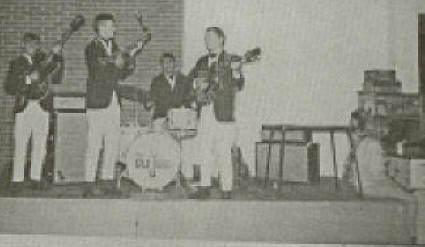 old Hour Theater. We were the “house band” at Cannonsburg Ski Lodge north of
Grand Rapids. We played halftime for the Blazers football games (in the
rain/snow, on an ungrounded stage). The JuJus basically played for anyone
willing to pay or convince us we’d get “great exposure” by appearing. We
operated a teen club called “The Island” in Ludington for a summer in about
'67. We played nightly and brought in other bands, The Electric Prunes & The
Kingsmen, being a couple.
old Hour Theater. We were the “house band” at Cannonsburg Ski Lodge north of
Grand Rapids. We played halftime for the Blazers football games (in the
rain/snow, on an ungrounded stage). The JuJus basically played for anyone
willing to pay or convince us we’d get “great exposure” by appearing. We
operated a teen club called “The Island” in Ludington for a summer in about
'67. We played nightly and brought in other bands, The Electric Prunes & The
Kingsmen, being a couple.
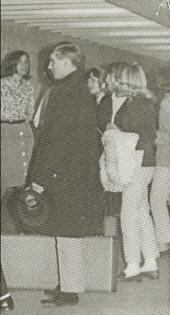
60s: How did you manage to get national acts like The Electric Prunes and
The Kingsmen to perform at the Island?
RS: It's amazing what money will do. We paid and they played. We
wanted The Jefferson Airplane, but $75,000 for a Tuesday night was pretty
difficult to retrieve in Ludington.
60s: How far was the band's normal touring territory?
 RS: We played most places between Saugatuck and Petosky - small
places and large. We never played very many “parties” like a lot of bands
did.
RS: We played most places between Saugatuck and Petosky - small
places and large. We never played very many “parties” like a lot of bands
did.
60s: Did The JuJus have a manager?
RS: Jim Geeting was the only “real” manager we ever utilized. Jim put a lot
of effort into us. I used to think that perhaps he was trying to live things
through us that he’d have like to have done himself. He was responsible for
The Island. He set it up, financed it and somehow “encouraged” us (to
believe) we could do it. I don’t recall any great money being made from it,
but we had a great time and learned a lot that would carry the band further.
Jim always insisted that we dress as a group. He told us it was a lot easier
to book a “clean band”.
60s: Did The JuJus participate in any Battle of the Bands?
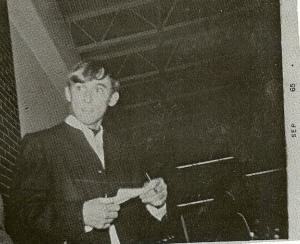
RS: Yes we played at them, won a few, lost a few. Most band battles
were really only a showing of who could bring a group of the loudest
friends. I never thought much of them. I remember playing in and going to
several where the “best band” didn’t have a hope. I remember going to one
that The Soulbenders played and I believe lost. Personally they were one of
the better bands around. But at any job you were on stage and that was the
important part. People were hearing your music.
60s: How would you best describe the band's sound?
RS: I came from a very broad exposure to music, from Hillbilly to
classical. Junior, Gorski and I were all in a high school band program that
was second to none. Ray came from folk music. People don’t realize that The
JuJus were always evolutionary in a decade of revolution. We began with a
sax, guitar and drum. There was nowhere to go but saxophone type rock n’
roll. We added Ray and turned into a folk-rock band and also with a Gerry &
The Pacemakers sound with a sax. After Ray and Junior left, we had to
“reinvent” again. We became straight out rock (no ballads). Rick was
developing into a good guitarist. Ron Burke had a rougher, stronger voice
and we changed as a group into a more progressive rock sound. I recently
heard some cuts, about the last I ever did with the band, and I was amazed.
They sounded pretty good even over forty years later. They were kind of a
JuJus answer to Sgt. Pepper.
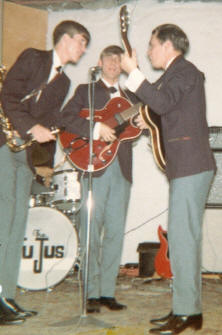
60s: How popular locally did The JuJus become?
RS: There was a period during “You Treated Me Bad”, that led us to be
recognized everywhere we travelled. For the most part we enjoyed the fame
but it had a price. While playing the Pit we were “gang” threatened because
some guy’s girl decided she liked Ray instead of him. There was quite a
hullabaloo that night, but we were taken out as soon as we finished. After
an overcrowded gig at East Grand Rapids School's gym, a couple hundred
teen-aged girls mobbed us as we were attempting to leave. Security wasn’t
much in those days, and we ended up with uniforms ripped up and a good
reason why most of us have less hair now.
6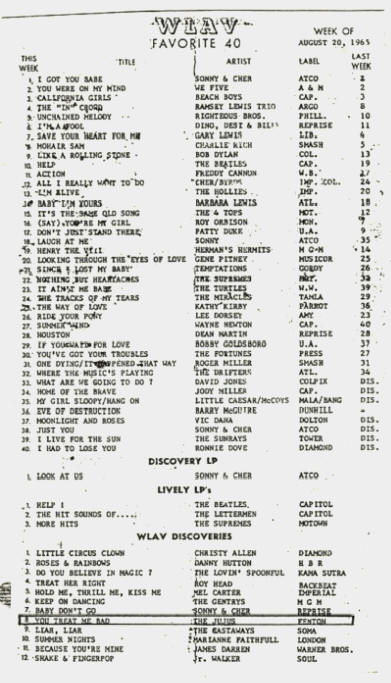 0s: What other local groups do you especially recall?
0s: What other local groups do you especially recall?
RS: It seemed that when we started there weren’t many. One of the
first groups that impressed me was Dave & The Shadows. Jim Wilson was the
guitarist and quite talented. The Kingtones were and still are impressive.
They learned to be a “show band”. I remember when Me & Dem Guys rolled into
town and set up shop at the Elbow Room. They were thought of as a “bar
band.” The fact is they were good musicians, personable and entertainers,
too (a show band style). I met a lot of these people working for Bill
Ferrell. He ran a music store on South Division. I worked and taught there
for several years. (Working at) Ferrell’s was great exposure with
opportunities to talk and listen to musicians of all sorts and styles coming
in.
60s: Did The JuJus back any national acts?
RS: We did appear with on the same bill as Chubby Checker, Al Green,
The Kingsmen and even Buster Mathis (yup, the boxer) when he was trying to
go from punching to crooning. I don’t recall that we ever backed anyone
else. I know that in years since Max has recorded with a lot of group and
single acts.
60s:
What do you recall about The JuJus recording sessions?
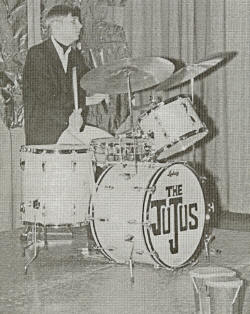
RS: The JuJus recorded first at the Hour Theater, which in off hours
was Fenton Records. “You Treated Me Bad” and some others were done there. We
traded recording time for Showtime between films. We also recorded at Chess
Records in Chicago and that was something. Many greats of different styles
recorded in that run-down old place. Word had it that musicians who’d had
hits recorded there wouldn’t allow it to be fixed up; they were afraid the
studio would “lose its sound, man”. Our first recording session was for the
songs, “Runaround Girl”, “She’s My Girl”, “Summertime”, and “Hey, Little
Girl”. My last studio time was at Phil Robert’s Studio. We did R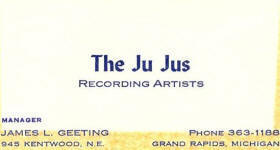 ick’s songs
there. Phil always had ideas flying all over; all you had to do was grab the
ones you liked. We did release two 45s, “You Treated Me Bad” b/w “Hey
Little Girl”, with Ray, Max, Gorski and I. Later we released “I’m Really
Sorry” b/w “Do You Understand Me”,
ick’s songs
there. Phil always had ideas flying all over; all you had to do was grab the
ones you liked. We did release two 45s, “You Treated Me Bad” b/w “Hey
Little Girl”, with Ray, Max, Gorski and I. Later we released “I’m Really
Sorry” b/w “Do You Understand Me”,
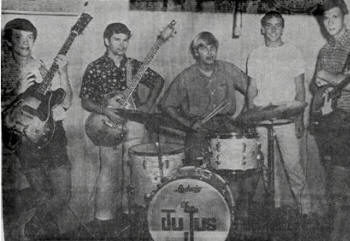 with Rick, Ron, Ron and I. We did all the
marketing, delivering, collecting and running orders ourselves. We knew
nothing of what we should be doing and learned by seeing what worked. It was
quite an experience for us. Those records sold for about ninety-eight cents
of which we ended up with about a dime. We collected our dimes and then
figured out how to pay for our expenses. On October 3, 1965, “You Treated Me
Bad” hit number two in the Western Michigan area. The Beatles had the
number one hit with “Yesterday”
with Rick, Ron, Ron and I. We did all the
marketing, delivering, collecting and running orders ourselves. We knew
nothing of what we should be doing and learned by seeing what worked. It was
quite an experience for us. Those records sold for about ninety-eight cents
of which we ended up with about a dime. We collected our dimes and then
figured out how to pay for our expenses. On October 3, 1965, “You Treated Me
Bad” hit number two in the Western Michigan area. The Beatles had the
number one hit with “Yesterday”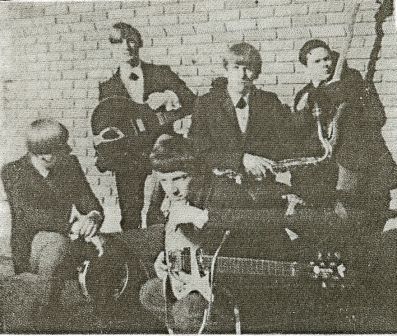 .
.
60s: Who was the
band's primary songwriter?
RS: Ray Hummel wrote most of the original songs we did at first, and
both tunes on our first release. Later Rick Stevens primarily wrote.
Generally one of the two would develop the bases of the songs and we’d all
add, subtract or make changes as the song grew. The JuJus were a “group”; we
all participated in everything, but Ray and Rick certainly deserved their
names on the labels. Ray also released a single “Fine Day” and Gentle Rain”
with Bill and Max, which was also on Fenton Records, like our first single.
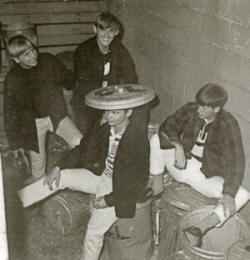 60s: There are several unreleased JuJus songs that have survived. Do you
know how many?
60s: There are several unreleased JuJus songs that have survived. Do you
know how many?
RS: It’s been a lot of years gone by since all this went on but
-thanks to a get together with Junior and Bill Gorski- I can say that “yes,
we do have never-released material”. The alternate version of “You Treat Me
Bad” exists because Dave Cullenbeck gave us acetates of the song when we
finished recording in order to pass them out to radio stations prior to
receiving the actual finished records. “I’m Cryin’” was recorded in
September, 1965 at Great Lake Recording Studio. The fact is that there is
still enough “recorded” material available for an album. It could be an
anthology of The JuJus, 1965-1967, and feature the various combinations of
personnel. I have learned that The JuJus songs have been available on
compilation albums and CDs since the
mid-Eighties.
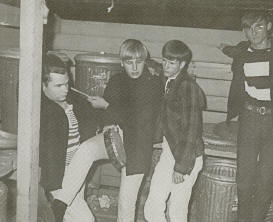 60s: When and why did
The JuJus break up?
60s: When and why did
The JuJus break up?
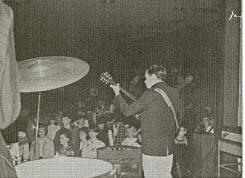
RS: As I said before, The JuJus were an evolutionary band. We lost
Ray just when The JuJus began “happening”, then Max and then Bill. I think
that was '66, maybe '67. We had to change to survive. We added Bret as lead
singer, Ron Burke on guitar and Ron Homrich on drums. We had a good
potential sound but Bret chose to leave. Ron Burke began singing lead. Rick
began writing and developing his play so we headed in a different direction.
We were putting it together again when Uncle Sam offered me a contract in
1968. I must admit however, after Junior and Gorski left it could never be
"The JuJus" again.
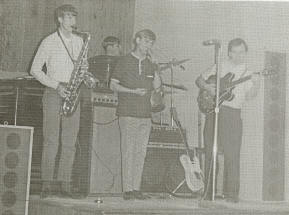
6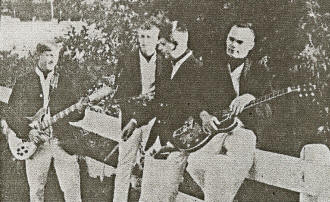 0s: How do you best summarize your experiences with The JuJus?
0s: How do you best summarize your experiences with The JuJus?
RS: About the only thing to say about having been with The JuJus is that
it was great! It'd be a terrific experience for anyone. There’s nothing
quite the same as being on a stage, playing your music and you, the others
in the band, and the crowd, are rolling, with the band feeling as one, or
the feeling you get when hearing “your music” on the radio or the feeling of
having “your song” as number two. We felt special being The JuJus. For
instance, late one night Gorski and I were walking down Division Avenue,
discussing our favorite topics: Songs, bands, religion, politics and girls.
Along came a car full of short haired intoxicated greasers, screeching to a
stop in front of us. A guy screamed out “get them!” and here we were-two of
us versus five of them. The last out of the car was a girl who screamed,
"It's The JuJus!!" She saved us, yelling that name. We all ended up talking,
having a laugh, and signing autographs. The fact that forty years later the
music of The JuJus is still available and that there is still some interest
in the band is just plain amazing.
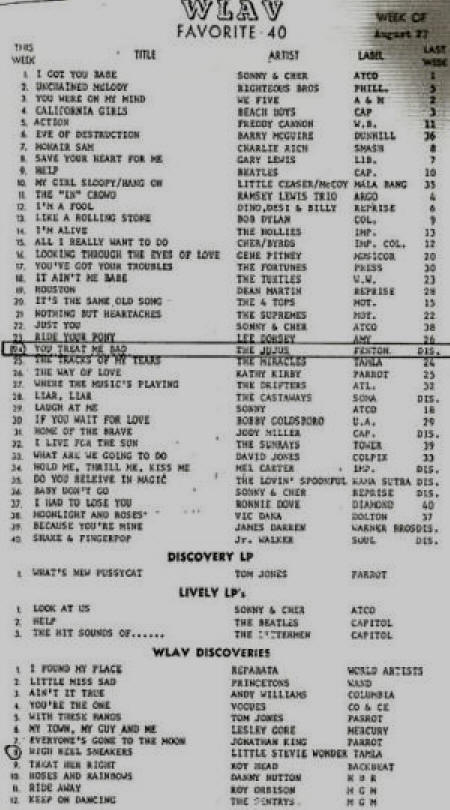
With thanks to www.60sgaragebands.com ( Mike Dugo) and RS (Rod Shepard) for the interview on the history of The JuJus and generous time provided for the compilation of this CD.
